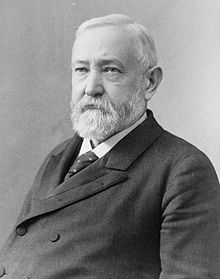📖 Presidential Profile
Comprehensive overview of leadership, policies, and historical significance
📋 Biography & Political Journey
The Grandson President’s Political Inheritance
Benjamin Harrison carried the weight of his famous grandfather’s legacy when he assumed the presidency in 1889. As the grandson of William Henry Harrison, the ninth president, Benjamin faced constant comparisons to his predecessor while trying to establish his own political identity. Despite winning the presidency while losing the popular vote to Grover Cleveland, Harrison approached the office with a clear vision for expanding American economic and military power.
Harrison’s legal background and military service during the Civil War shaped his approach to governance. He had served as a brigadier general in Sherman’s Atlanta campaign, earning respect for his leadership under fire. His presidency would be marked by a similar attention to detail and methodical approach to policy implementation, though critics often found his manner cold and impersonal.
Economic Nationalism and the McKinley Tariff
The centerpiece of Harrison’s domestic agenda was the McKinley Tariff of 1890, which raised import duties to unprecedented levels, averaging nearly 50% on protected goods. Harrison believed that high tariffs would protect American workers and industries while generating revenue for an expanding federal government. The policy reflected a broader philosophy of economic nationalism that prioritized American production over international trade.
Harrison’s administration also oversaw the passage of the Sherman Antitrust Act, the first federal legislation to limit corporate monopolies. While enforcement would prove weak during his presidency, the act established an important precedent for federal regulation of interstate commerce. “We Americans have no commission from God to police the world,” Harrison once declared, yet his domestic policies suggested a belief in strong federal authority within American borders.
Expansion and International Relations
Harrison’s presidency witnessed significant territorial and international developments. His administration oversaw the admission of six new states—North Dakota, South Dakota, Montana, Washington, Idaho, and Wyoming—more than any president since the founding fathers. This expansion reflected Harrison’s belief in American continental destiny and the need for new markets for American goods.
The first Pan-American Conference convened in Washington during Harrison’s presidency, establishing the International Union of American Republics (later the Organization of American States). Harrison saw this as an opportunity to expand American influence in Latin America through economic rather than military means, though critics viewed it as economic imperialism disguised as cooperation.
The Force Bill and Civil Rights Controversy
Harrison’s support for the Federal Elections Bill (known by opponents as the “Force Bill”) represented his most controversial domestic initiative. The legislation would have provided federal oversight of congressional elections in the South, effectively protecting African American voting rights. Southern Democrats and some Northern Republicans opposed the measure, arguing it represented dangerous federal overreach.
The bill’s failure highlighted the limitations of Harrison’s political influence and the Republican Party’s waning commitment to civil rights. Harrison’s inability to secure passage of voting rights legislation marked a turning point in post-Reconstruction politics, effectively abandoning African Americans to Southern Democratic control for the next several decades.
The Talking Refrigerator and White House Electrification
Harrison became the first president to have electricity installed in the White House, though he and his wife were reportedly so afraid of being electrocuted that they refused to touch the light switches themselves. The First Family would often ask servants to operate the lights or simply leave them burning all night rather than risk touching the newfangled electrical controls.
The president’s fear of electricity became a source of gentle mockery among Washington society, with some joking that the man who could face Confederate bullets was terrified of light bulbs. Harrison’s wife, Caroline, was equally suspicious of the new technology, convinced that electrical currents might somehow escape from the fixtures. Their cautious approach to innovation provided a humorous contrast to Harrison’s otherwise serious demeanor and became a favorite anecdote among White House staff.
Humor & Jokes
Sherman Antitrust Act
Harrison signed the Sherman Antitrust Act, then watched as courts ignored it. It was like…
Read More →Greatest Wins
🌎 Pan-American Conference Leadership
Harrison hosted the first Pan-American Conference, establishing lasting diplomatic relationships and trade partnerships across the…
Read More →Epic Fails
⚓ Chilean Crisis Naval Brinksmanship
Harrison's aggressive military posturing nearly sparked war with Chile over a barroom brawl, showcasing dangerous…
Read More →